Smart Manufacturing as a Survival Strategy: From Pilot Projects to Everyday Operations
Not long ago, “smart manufacturing” sounded like a future-facing buzzword. Plants might run a small pilot with IoT sensors, test AI-driven quality control, or experiment with digital twins — but these projects stayed on the fringes. That era is over.
What Has Changed & Why Now
The latest State of Smart Manufacturing report from Rockwell Automation makes it clear: digital transformation has moved from side projects to the main stage. More than half of manufacturers are already piloting smart manufacturing technologies, 20% have scaled them, and another 20% are preparing future investments. The message is simple — smart manufacturing has become less about innovation theater and more about day-to-day survival.
For years, efficiency gains were the central argument for smart factories. The promise was faster cycles, reduced errors, and improved OEE. Those benefits remain, but the ground has shifted.
Today, manufacturers face a combination of inflation, supply chain instability, and persistent labor shortages. Traditional methods — adding shifts, hiring more people, or squeezing maintenance teams harder — no longer work. The operating environment itself is forcing companies to seek tools that keep operations resilient, not just efficient.
Three forces are converging to make adoption urgent:
- Economic pressure. Inflation and slow growth leave little room for inefficiency. Downtime that once felt tolerable now cuts directly into already thin margins.
- Workforce challenges. Skilled labor is in short supply, and the gap is widening. AI and automation are increasingly being used to take on repetitive inspection and monitoring tasks so humans can focus on higher-value work.
- Volatile demand. Supply chains are still unpredictable, and customer demand is shifting quickly. Connected systems give managers real-time visibility to adjust schedules and resource use on the fly.
This isn’t about staying ahead anymore. It’s about staying operational.
The Broader Impact: From Efficiency to Resilience
The key insight from Rockwell’s report is that smart manufacturing delivers something bigger than incremental efficiency: resilience.
- Real-time monitoring keeps small machine issues from escalating into major downtime.
- AI-enabled quality control reduces waste and prevents customer complaints before they happen.
- Simulation and digital twins allow safe experimentation, cutting risk out of process changes.
- Automation frees limited staff from repetitive tasks, allowing them to focus on improvement and strategy.
In short, smart technologies don’t just make factories faster — they make them more adaptable in an environment defined by uncertainty.
What Manufacturers Should Do
The shift is clear: digital transformation is no longer optional. Companies that treat AI, IoT, and automation as experimental side projects risk being left behind while competitors integrate them into everyday workflows.
Practical steps forward include:
- Start with targeted use cases. Focus on one area — downtime reduction, predictive maintenance, or AI quality control — and prove value quickly.
- Plan for scale. Pilots are useful, but ROI comes when solutions move plant-wide.
- Invest in people. Analytical thinking, communication, and AI literacy are now as critical as machine-handling skills.
- Strengthen security. With connected systems, cybersecurity becomes part of production stability.
Manufacturers that embrace this shift are building operations that can absorb disruption, adapt to demand, and make the most of scarce labor. Those who hesitate risk running factories that look busy on the surface — but fall further behind in the metrics that really matter.
About MDCplus
Our key features are real-time machine monitoring for swift issue resolution, power consumption tracking to promote sustainability, computerized maintenance management to reduce downtime, and vibration diagnostics for predictive maintenance. MDCplus's solutions are tailored for diverse industries, including aerospace, automotive, precision machining, and heavy industry. By delivering actionable insights and fostering seamless integration, we empower manufacturers to boost Overall Equipment Effectiveness (OEE), reduce operational costs, and achieve sustainable growth along with future planning.
Ready to increase your OEE, get clearer vision of your shop floor, and predict sustainably?
Other articles
While both involve structured review and analysis, their objectives, scope, and outcomes differ significantly. This article exploring this topic further.
